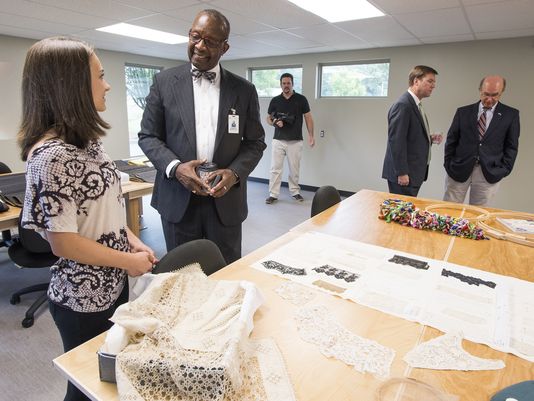Fiber arts program launched to train Upstate designers

From The Greenville News
Article by Nathaniel Cary, photo by Bart Boatwright
Textile executives from multiple Upstate companies banded together to fund a new program they hope will train a new generation of homegrown textile designers to carry on the textile heritage of the Carolinas.
Many of those designers may come right from Greenville, trained at a new first-in-the-nation program run by the Greenville Fine Arts Center.
Greenville County Schools officially launched the program Wednesday. The inaugural group of 24 students, who each auditioned for entrance into the program, will take a course-load built around design and use of fibers in the textile industry.
Roy Fluhrer, Fine Arts Center director, conceived of the program years ago and approached business leaders three years ago with a plan for a program similar to an architectural design program that the center had started.
Fluhrer called it a way to give the county’s bright artistic students creative futures built in South Carolina.
The program drew interest from local companies who wanted to train and retain talented designers in the Upstate.
Five companies each contributed $25,000 while Greenville County Schools agreed to fund the salary for a teacher and paid for renovations for two portable buildings that now sit adjacent to the Fine Arts Center on Pine Knoll Drive in Greenville.
Sage Automotive Interiors in Greenville, Glen Raven Custom Fabrics in Anderson, Springs Creative in Rock Hill, Alice Manufacturing in Easley and Inman Mills helped purchase equipment for the program, Fluhrer said.
A fiber arts program in Greenville made sense for local businesses to support, Randy Blackston, vice president of operations at Glen Raven, said.
“There are billions of dollars of capital investment in the textile industry within 30 minutes of this school,” Blackston said. “More importantly, there are thousands and thousands of workers who work in the textile industry within 30 minutes of this school.”
The textile industry is beset by the preconceived notion that it’s a “dirty industry” whose reputation has been tainted by the number of jobs that have disappeared overseas, Dirk Pieper, president and CEO of Sage Automotive Interiors, said.
“The arts and design are a very important part of our business so the opportunity to connect with students of the high school age and get them involved early in our industry of textiles and automotive textiles is a fantastic opportunity to develop homegrown talent here to support our business,” Pieper said.
They’re working to change the perception of textiles, which is now high-tech, use new fabrics and design methods and are going to be a $56 billion industry employing more than 500,000 people in the United States, Pieper said.
“It’s thriving and of course it’s significant in South Carolina and in particular, the Upstate,” he said.
The industry in the Upstate is facing what leaders are calling a “silver tsunami” of retiring baby boomers and will need a new generation of skilled employees to fill their jobs.
“Workforce development is the single most important issue in terms of supporting the manufacturing industry,” he said.
As the manufacturing industry rebounded post-recession and the state’s leadership attracted new jobs, “It’s our role now to create the associates that are going to be able to work in these operations,” Pieper said.
Fiber arts students will learn to weave, knit and construct cloth. They will dye fabric, shape fabric, cut fabric into conceptual art forms or works of art, April Dauscha, fiber arts instructor, said.
Inside the remodeled portables, an open concept design splits the rooms into learning zones. A small classroom space with mannequins sits near the entrance with four computers connected to a photo printer. Tables with scraps of fabric, yarn and other materials and a large design table as well as a small kitchenette and laundry area complete the space.
Students will spend two hours each day in the studio learning from a curriculum designed with help from professors at N.C. State University, one of the nation’s leading textile programs.
The curriculum was built so students who complete the fiber arts program will have college credit that will either offset the amount of time it will take to complete the N.C. State bachelor of science degree or will allow students to study abroad or accept internships to gain added experience during their college years, Nancy Powell, professor in the College of Textiles, said.
The fiber arts program moves the school district closer to its goal of graduating students who are college or career ready, Superintendent Burke Royster said.
Companies involved in the program will interact with the students regularly, will facilitate visits to textile manufacturers and will offer internships, Pieper said.
Image: Greenville Fine Arts Center fiber art student Eileen Selby, left, talks with Greenville School Board member Kenneth Baxter Sr. during a tour of the school’s new one-of-a-kind industry-sponsored fiber arts program.

